|
|
|
Sort Order |
|
|
|
Items / Page
|
|
|
|
|
|
|
| Srl | Item |
| 1 |
ID:
111183
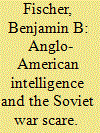

|
|
|
|
|
| Publication |
2012.
|
| Summary/Abstract |
During the Soviet war scare of the 1980s, British intelligence shared vital information from KGB officer Oleg Gordievsky with its American partners. The US intelligence community, however, was suspicious of the message and the messenger, dismissing Soviet 'war talk' as disinformation. Some officials even believed that the British had tweaked their reports to influence US policy. President Ronald Reagan, however, on the advice of Prime Minister Margaret Thatcher, listened to Gordievsky rather than his intelligence advisors. The war scare had a profound influence on Reagan's thinking about nuclear war, Kremlin fears, and Soviet-American relations that led him to seek a new détente with Moscow and the end of the Cold War through diplomacy rather than confrontation. Subsequent events and post-Cold War revelations vindicated Gordievsky. Reagan sought his advice on the eve of his first summit meeting with Mikhail Gorbachev and later expressed his gratitude during a private meeting in the Oval Office.
|
|
|
|
|
|
|
|
|
|
|
|
|
|
|
|
| 2 |
ID:
101128
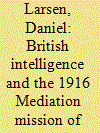

|
|
|
|
|
| Publication |
2010.
|
| Summary/Abstract |
Colonel Edward M. House, the close personal confidant of American President Woodrow Wilson, disembarked in Great Britain in January 1916 on a mission to bring the First World War to a close under the auspices of American mediation. Although his mission, which culminated in a secret pact between the United States and Great Britain known as the House-Grey Memorandum, has been studied by several scholars, the involvement of British intelligence with respect to that mission has never received more than cursory attention. Through a careful analysis of the surviving documents, this article reconstructs British intelligence's activities with respect to House's mission, examines the countermeasures that House employed as he attempted to protect the secrecy of his negotiations, delineates the role played by different British intelligence agencies and assesses their response to their findings.
|
|
|
|
|
|
|
|
|
|
|
|
|
|
|
|
| 3 |
ID:
082085
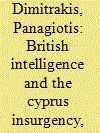

|
|
|
| 4 |
ID:
133418
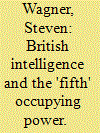

|
|
|
|
|
| Publication |
2014.
|
| Summary/Abstract |
At the end of the Second World War, British intelligence struggled to enforce strict limits imposed on Jewish immigration to Palestine. Holocaust survivors and Jews wishing to escape communism in Eastern Europe flooded the western Zones of occupation in Germany and Austria, while the Zionist movement worked to bring them to Palestine. Illegal immigration to Palestine was the key policy dispute between Britain and the Zionist movement, and a focus for British intelligence. Britain sought both overt and covert means to prevent the boarding of ships at European ports which were destined for Palestine, and even to prevent the entry of Jewish refugees into the American zones. This article highlights Britain's secret intelligence-gathering efforts as well as its covert action aimed to prevent this movement. It highlights a peculiar episode in the 'special relationship' between Britain and the United States, during which cooperation and partnership was lacking. British intelligence promoted a rumour that Soviet agents were using Jewish escape lines to penetrate Western Europe and the Middle East in order to persuade American authorities to prevent the movement of Jewish refugees. Instead, this article argues, American intelligence secretly cooperated with the Zionist organizers of the escape routes so to expose Soviet agents. Britain's attempt at deception backfired, and provided effective cover for the movement of hundreds of thousands of Jews during a critical period. Meanwhile its intelligence had dramatically improved, but policymakers failed to reassess Britain's ability to sustain immigration restrictions and the indefinite detention of tens of thousands of illegal migrants.
|
|
|
|
|
|
|
|
|
|
|
|
|
|
|
|
| 5 |
ID:
084062
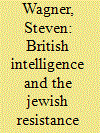

|
|
|
|
|
| Publication |
2008.
|
| Summary/Abstract |
At the end of the Second World War, British and Zionist interests came into conflict over the issue of Jewish immigration to Palestine, which raised the broader issue of what sort of National Home could exist within the British Mandate. As a result, in 1945-46, the three Jewish armed groups in the Mandate, the Haganah, Etzel and Lehi, started a loosely coordinated armed struggle against British rule. Even the moderates in the Jewish Agency rejected their former partner against Hitler, Britain, and used force against it in order to achieve their political goals. This article assesses British intelligence on these developments, and demonstrates that it failed to anticipate or even to understand the threat until the destruction of the King David Hotel. The article demonstrates that these mistakes occurred because British intelligence relied heavily on the intelligence organs of the Jewish Agency itself for intelligence about political threats within Palestine. The article assesses this intelligence failure, and its heavy costs. However, it denies that bad intelligence caused British failures in the Mandate. On the contrary, that failure stemmed from deeper problems of policy.
|
|
|
|
|
|
|
|
|
|
|
|
|
|
|
|
| 6 |
ID:
134060
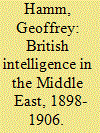

|
|
|
|
|
| Publication |
2014.
|
| Summary/Abstract |
This article examines British intelligence efforts in Turkish Arabia at the turn of the twentieth century. It argues that intelligence collection was really three separate efforts, carried out by the War Office, the Foreign Office, and the Government of India, and it reflected concerns about British decline, the problems experienced during the Boer War, as well as an effort to penetrate the 'information order' of India's sub-empire. Although intelligence efforts suffered from bureaucratic disharmony in Whitehall, and between London and the Government of India, valuable contributions were nevertheless made to Britain's knowledge of Turkish Arabia.
|
|
|
|
|
|
|
|
|
|
|
|
|
|
|
|
| 7 |
ID:
124122
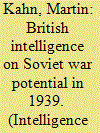

|
|
|
|
|
| Publication |
2013.
|
| Summary/Abstract |
The British government tried to create a peace front against German aggression in 1939 and the inclusion of the Soviet Union was controversial. This article investigates British intelligence on Soviet war potential in 1939 with the aim of comparing intelligence to reality, placing intelligence in context by following the British government discussion, commenting on earlier research about British intelligence on Soviet war potential and trying to find explanations for the fact that intelligence was far from reality. British assessments were of importance and earlier research is amended.
|
|
|
|
|
|
|
|
|
|
|
|
|
|
|
|
| 8 |
ID:
111182
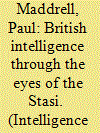

|
|
|
|
|
| Publication |
2012.
|
| Summary/Abstract |
The German parliament's Law on the Stasi Records, passed in 1991, extended the principle of freedom of information to the records of a Communist security service. By so doing, it has given historians, former targets of Stasi intelligence collection and others an unprecedented insight into the operations of such a service. Enough records of the Stasi's trials department have been made available to reconstruct a picture of the work of British intelligence agencies in the years 1945-61, and above all the work of the Secret Intelligence Service (SIS). They show that SIS was a very skilful service which obtained the high-grade intelligence it sought. However, SIS's work in East Germany was undone in the late 1950s by the treason of the KGB's penetration agent in it, George Blake.
|
|
|
|
|
|
|
|
|
|
|
|
|
|
|
|
| 9 |
ID:
102953
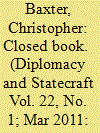

|
|
|
|
|
| Publication |
2011.
|
| Summary/Abstract |
This article focuses on British intelligence in China, Japan, and Korea from the end of the Second World War to the outbreak of the Korean War in June 1950. It seeks to ascertain whether the collection of secret intelligence and its subsequent interpretation provided an accurate picture of Soviet and local communist intentions in East Asia. Since the war against Japan began, the region was largely an American responsibility and remained so after 1945 when they occupied Japan, Korea below the 38th parallel, and sent forces to China. Much of the intelligence effort for East Asia also devolved upon the Americans. Yet, the British retained an intelligence interest there not least because of their extensive commercial assets in China and the region's proximity to Britain's imperial position in Southeast Asia. That interest gathered pace after growing Communist threats inside China and Korea. However, the available intelligence resources for the Far East as a whole were scarce, making it difficult to piece together a clear picture of fast moving events in East Asia.
|
|
|
|
|
|
|
|
|
|
|
|
|
|
|
|
| 10 |
ID:
113713
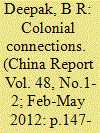

|
|
|
|
|
| Publication |
2012.
|
| Summary/Abstract |
Relying on primary sources in India and China, especially British intelligence reports, this essay attempts to reconstruct colonial era linkages between the two countries from 1905 to 1930. In the first section, the essay examines the connections that Indian nationalists and revolutionaries had with leading Chinese nationalists such as Sun Yat-sen and Zhang Taiyan in Japan and mainland China, and their attempts to devise strategies to dislodge the British from India through armed struggle. This part also discusses the support and sympathy of the Chinese nationalists for the Indian people and the Indian cause. The second section deals with the nature of Ghadar activities in various centers across China such as Hong Kong, Shanghai, Hankou, Nanjing and Beijing and posits that during the initial phase (1913-18), Ghadar activists acted independently and tried to enlist the support of the Chinese nationalists and Germans to procure arms and ammunition for overthrowing the British in India. During the second phase, however, owing to the Bolshevik revolution and the First United Front between the Communists and Nationalists in China, Ghadar activists began vying for the support of both Chinese parties. They were successful in this regard and in turn supported the campaign against the warlords, and even offered their services for the national cause of China. This essay argues that Ghadar nationalists played a pioneering role in uniting the peoples of China to support the fight for Indian independence. Even if much of our information about these national heroes is obtained through British intelligence reports, which are far from comprehensive, let alone objective, it still tells us a great deal about an era in which the revolutionaries of India and China extended helping hands towards each other.
|
|
|
|
|
|
|
|
|
|
|
|
|
|
|
|
| 11 |
ID:
032395
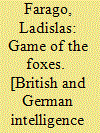

|
|
|
|
|
| Publication |
London, Hodder and Stoughton, 1971.
|
| Description |
xxi, 696pHbk
|
| Standard Number |
0-340-15879-4
|
|
|
|
|
|
|
|
|
|
|
|
Copies: C:1/I:0,R:0,Q:0
Circulation
| Accession# | Call# | Current Location | Status | Policy | Location |
| 009479 | 940.5485/FAR 009479 | Main | On Shelf | General | |
|
|
|
|
| 12 |
ID:
125099
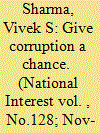

|
|
|
|
|
| Publication |
2013.
|
| Summary/Abstract |
CORRUPTION, MORE often than not, seems to resemble a plague. Afghanistan, where the CIA and British intelligence (in competition with the Iranians) have quite literally been handing over duffel bags stuffed full with taxpayer money to President Hamid Karzai and his associates, is perhaps the most prominent example of its invasiveness and hardiness. Nothing seems to be able to eradicate it. Immunization efforts fail.
|
|
|
|
|
|
|
|
|
|
|
|
|
|
|
|
| 13 |
ID:
111179
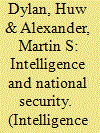

|
|
|
| 14 |
ID:
145241
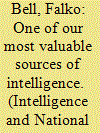

|
|
|
|
|
| Summary/Abstract |
During the Second World War, secret information derived from enemy prisoners of war (POWs) was a valuable asset to British intelligence. Until 1944, the POW system had expanded from a small interrogation camp in the Tower of London to a multi-step structure with the so-called Combined Services Detailed Interrogation Centre, United Kingdom (CSDIC(UK)) at its top. The methods employed to collect reliable information included microphones, stool pigeons and different interrogation techniques. The results were read by all services and several ministries which provided a unique insight into German capabilities, intentions and thoughts.
|
|
|
|
|
|
|
|
|
|
|
|
|
|
|
|
| 15 |
ID:
079218
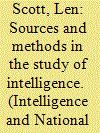

|
|
|
|
|
| Publication |
2007.
|
| Summary/Abstract |
Since September 2001, jihadist attacks on the West and the war on Iraq have focused public attention on intelligence and invigorated academic interest in intelligence studies. Once neglected in academia, the subject is now increasingly firmly established in British and American universities. Common interest in understanding the value as well as the limitations of intelligence nevertheless disguises differing epistemological foundations. Until the late 1980s official British attitudes to secrecy, including opposition to any form of public accountability, inhibited and distorted public understanding. The last two decades have seen changing attitudes to both archival disclosure and parliamentary accountability, though the significance of these is contested. This article outlines these changes as well as how various authors have used various sources to represent the secret world. Two specific areas are explored: covert action and the joint intelligence machinery. The former presents particularly interesting challenges to academic and public scrutiny (in some contrast to the United States) while the latter has received unprecedented illumination in the wake of the failure to discover weapons of mass destruction in Iraq. While opportunities for understanding British intelligence remained constrained they are nevertheless more propitious than they have ever been
|
|
|
|
|
|
|
|
|
|
|
|
|
|
|
|
| 16 |
ID:
101124
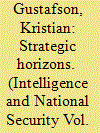

|
|
|
|
|
| Publication |
2010.
|
| Summary/Abstract |
The article deals with the role and benefit added by the use of horizon scanning in intelligence analysis in the UK. It asserts that horizon scanning as a technique, while not entirely akin to the tradecraft of intelligence analysis, has much to contribute to its success. Specifically, is asserts that a horizon scanning function in the JIO and the Cabinet Office should be made permanent, as bureaucratic tumult in the wake of the 2010 SDSR have left the capability un-staffed, though still established. Within the UK intelligence community, such an organization may have positive roles to play in the processes of challenge, the setting of collection priorities, and overall long-term UK intelligence assessment at the national level.
|
|
|
|
|
|
|
|
|
|
|
|
|
|
|
|
| 17 |
ID:
142647
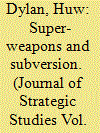

|
|
|
|
|
| Summary/Abstract |
This article examines British deception operations in the early Cold War. It illustrates how, in the years before Britain could threaten atomic retaliation, Britain’s deception organisation, the London Controlling Section (LCS) was tasked with conducting operations to deter the USSR and China from starting a war or threatening British interests. It introduces a number of their ploys – some physical and military, others subversive and political. It argues that the LCS faced significant challenges in implementing its deceptions. Repeating the great strategic successes of the Second World War was extremely difficult; what remained for the Cold War were more limited deceptions.
|
|
|
|
|
|
|
|
|
|
|
|
|
|
|
|
| 18 |
ID:
171229
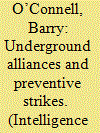

|
|
|
|
|
| Summary/Abstract |
This article examines the role of intelligence in the formation of British war policy during the Napoleonic Wars, 1807–1810. During this period, intelligence was conceived of broadly and was inseparably linked with secret diplomacy; to attempt to separate these strands would be anachronistic. It shall be argued that a lack of professionalism and institutional support was one of the key factors that limited the effectiveness of intelligence but that nevertheless it exerted a significant influence over Britain’s war policy. Ultimately, it is argued that the intelligence dimension is central to understanding British policy during the Napoleonic Wars.
|
|
|
|
|
|
|
|
|
|
|
|
|
|
|
|
| 19 |
ID:
164187


|
|
|
|
|
| Summary/Abstract |
This article examines the topic of the World Federation of Scientific Workers (WFSW) during its period of greatest activity, between 1946 and 1964. The WFSW was the only Soviet Front Organisation to be both founded in, and run from, the UK; and was a subject of intense interest for British intelligence during the early years of the Cold War. In particular, this article seeks to demonstrate how the Federation’s fortunes reflected those of the broader international ‘Peace’ movement, whilst simultaneously examining the reasons behind Whitehall’s interest in the group, and how this changed over time.
|
|
|
|
|
|
|
|
|
|
|
|
|
|
|
|
|
|
|
|
|